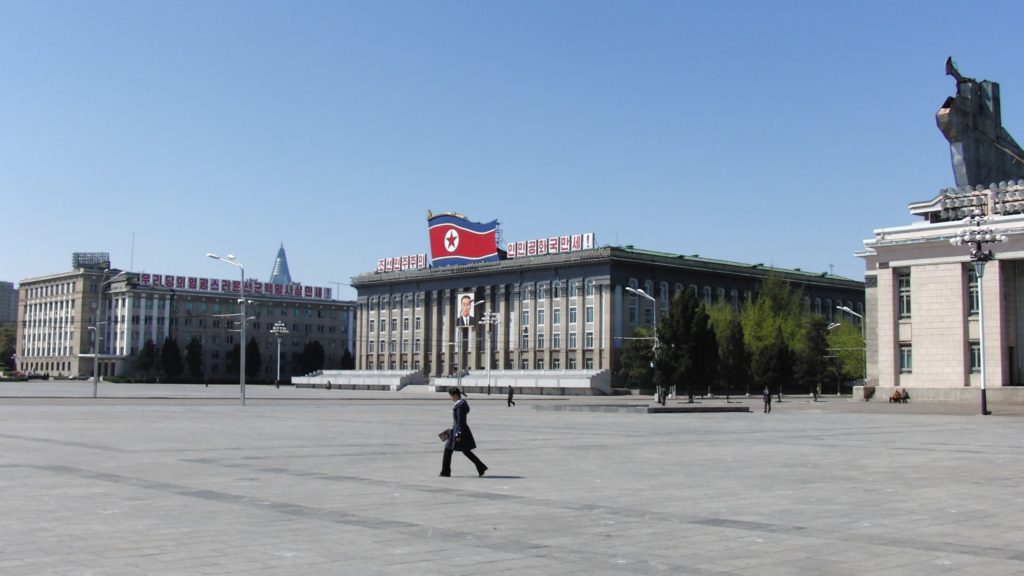The Peninsula
May 2016: Party Congress Meets, but Two Koreas Do Not

By Nicholas Hamisevicz
In May, much of the attention toward the Korean peninsula was drawn toward the northern part as North Korea held its first Party Congress in thirty-six years. While looking for possible changes to emerge from the Kim Jong-un regime, the stalemate in inter-Korean relations continues. North Korea did offer talks, but South Korea turned them down. North Korea’s missile tests and a confrontation in the West Sea didn’t help either. With the completion of military exercises, South Korea’s National Assembly elections, and North Korea’s Party Congress, the atmosphere should be improved for inter-Korean relations; however, animosity, provocations, and mistrust make near-term progress unlikely for the two Koreas.
On the last day of the Party Congress, Kim Jong-un proposed conducting military-to-military talks with South Korea. South Korea dismissed this initial offer. Then on May 20, North Korea’s National Defense Commission, which is chaired by Kim Jong-un, released an open letter that also included a proposal for bilateral military talks. South Korea again rejected the proposal because it didn’t include the possibility of discussing the elimination of North Korea’s nuclear weapons. North Korea tried once more for military talks with South Korea; North Korea’s Ministry of the People’s Armed Forces sent a note to the South Korean military suggesting the meetings wouldn’t be about assigning blame, but would work to reduce overall tensions. South Korea was still unwilling to engage in the bilateral talks.
Perhaps part of South Korea’s concern with undertaking military discussions with North Korea was North Koreas recent missile tests. North Korea tested its Musudan missile three times in April and an intermediate range missile at the end of May. Despite all of these recent launches appearing to end in failure, North Korea continues to learn from them in an attempt to enhance its missile program. Furthermore, it seems more plausible that the U.S. and South Korean governments believe North Korea could “mount a small nuclear warhead on short- and medium-range missiles capable of hitting much of Japan and South Korea.”
Announcements and news stories suggested that the South Korean government was trying to demonstrate that it understood the North Korean threat and had sufficient countermeasures. The South Korean military stated it was trying to move forward with funding for a kill chain missile strike capability and its own missile defense system. Moreover, the South Korean military said it was developing submarine-launched ballistic missiles. Lastly, the South Korean government seemed to be using diplomatic pressure and incentives during Park Geun-hye’s trip to countries in Africa to nations that have been friendly to North Korea. Reports suggested the South Korean government was encouraging countries to end their security interactions with North Korea; the Park administration indicated that Uganda had agreed to cease its security ties with North Korea.
Lastly, a naval skirmish in the West Sea illustrated that it is not just missiles and nuclear weapons that can cause and escalation of conflict between the two Koreas. The South Korean military reported that its naval vessels fired upon a North Korean patrol boat and fishing boat that had crossed over the Northern Limit Line. North Korea claimed it was actually the South Korean ships that had encroached into North Korean territorial waters and warned: “we will open direct fire on any warship of the south Korean puppet forces without warning, if it intrudes into the extension of the Military Demarcation Line of our side even 0.001 mm in the hotspot of the west sea.”
Looking toward the upcoming months in 2016, this is a time period when more positive interactions between the two Koreas could occur. Throughout the first five months of the year, there was the warning that the U.S.-ROK military exercises, the National Assembly elections in South Korea, and the Party Congress in North Korea created a more difficult environment for inter-Korean relations. With all three events now completed, there should be a better environment for both sides to try to improve relations. However, the missile tests and lack of any hint of a possibility that North Korea is wiling to talk about and give up its nuclear weapons make it tough to anticipate quick progress in inter-Korean relations during this more favorable time of year.
Nicholas Hamisevicz is currently undertaking a PhD in World Politics at Catholic University. Previously he was the Director of Research and Academic Affairs for the Korea Economic Institute of America. The views here are the author’s alone.
Photo from Comrade Anatolii’s photostream on flickr Creative Commons.
